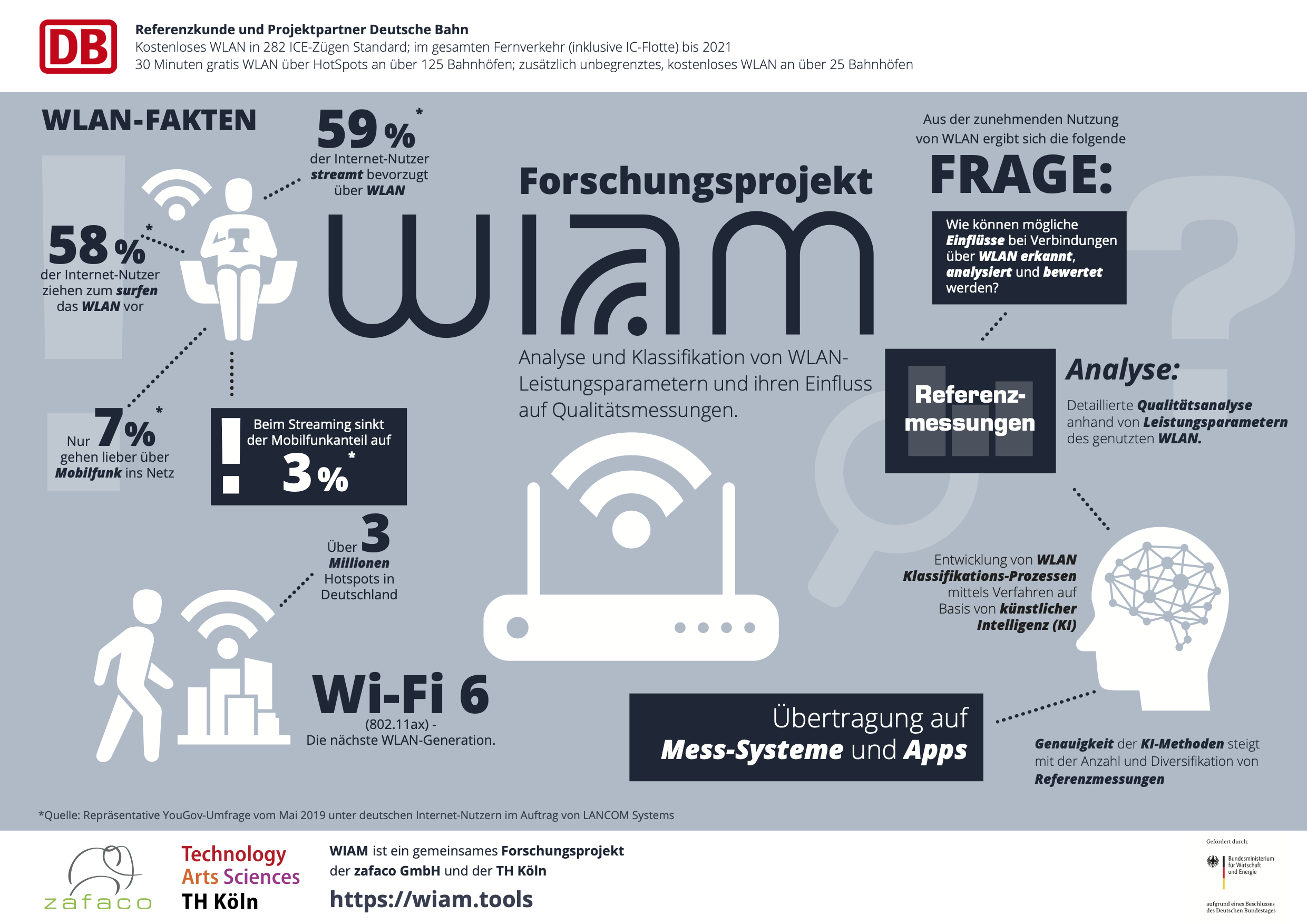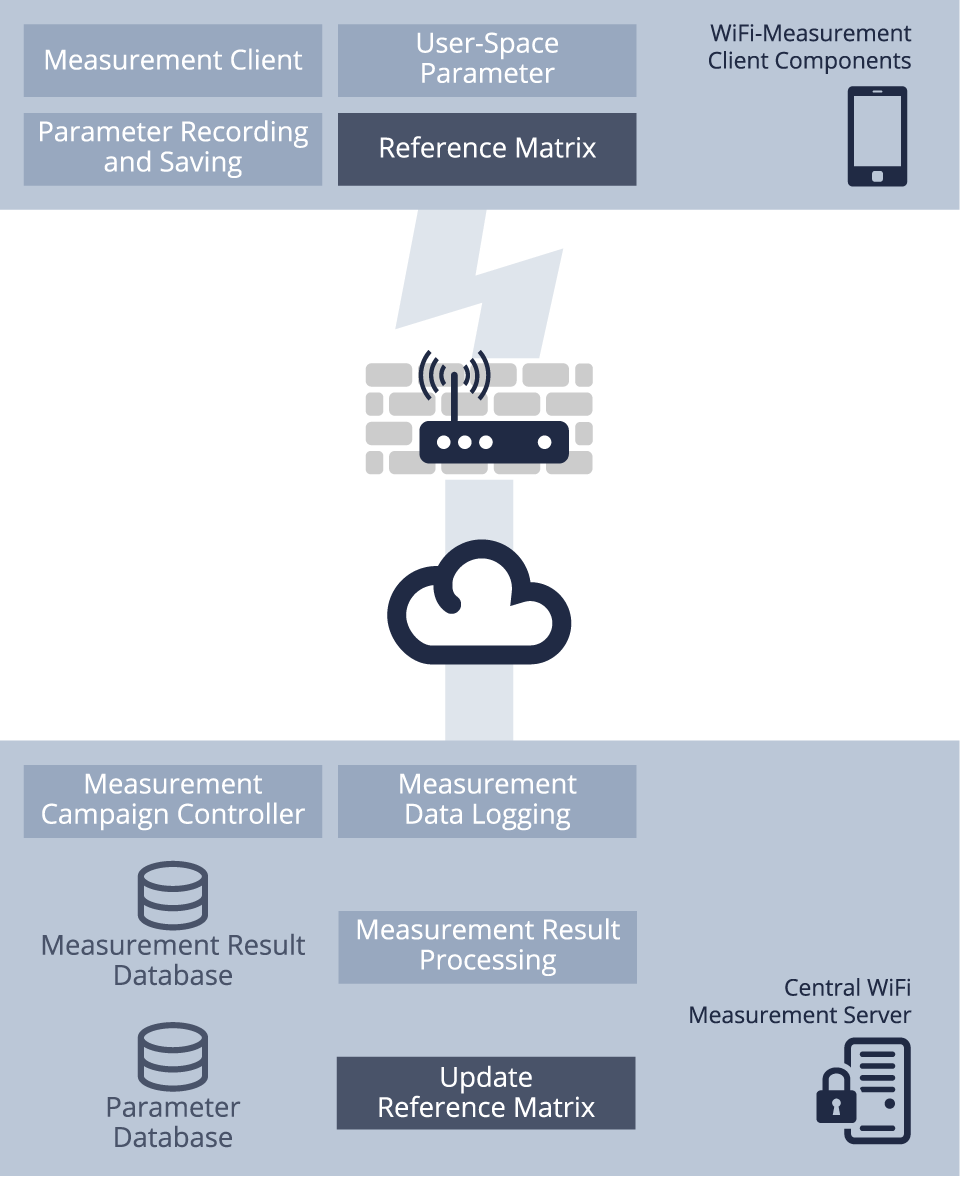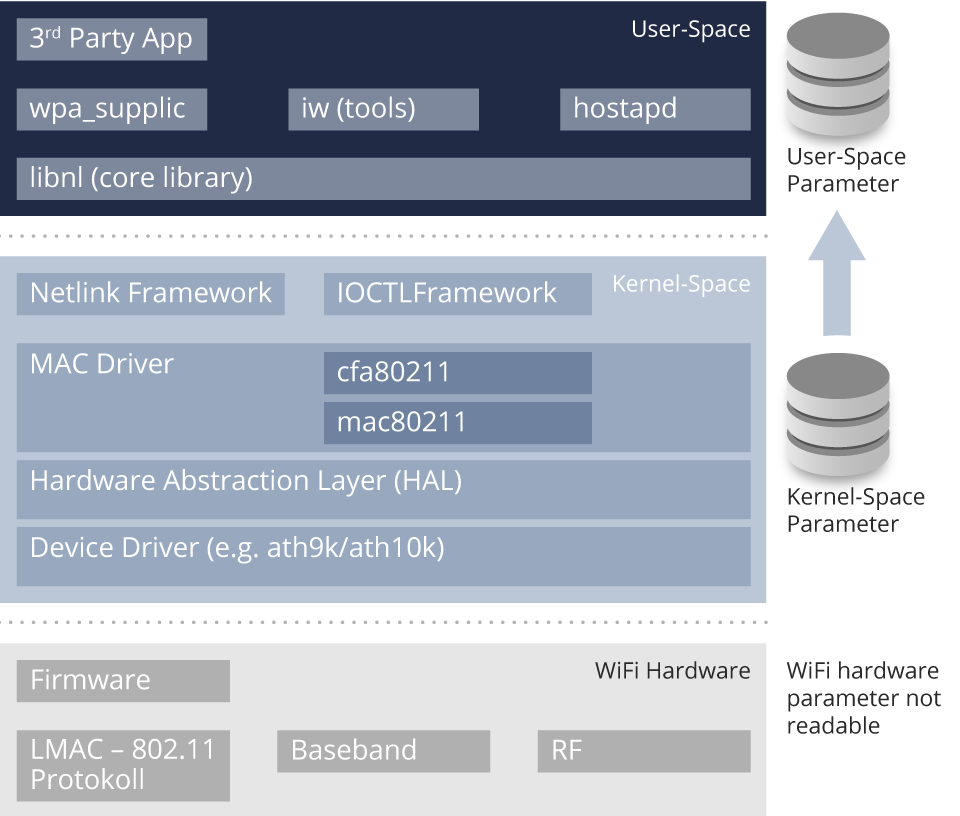WiFi Intelligent Analysis Measurement Tools
In May 2018, the two project partners zafaco GmbH and the Data Networks Research Group at the Institute of Communications Engineering at TH-Köln (University of Applied Sciences, Cologne) launched their new research project wiam.tools. The focus is on the development of a measurement system for the automated quality measurement of IEEE 802.11 wireless networks (WiFi) using own measurement sensors and crowdsourcing based smartphone measurement apps.
The project partners from industry and research combine their know-how in the areas of IP network technology, IP service benchmarking and data analysis. Together they form a powerful team of experts for successful cooperation.

WLAN performance analysis, why?
The future is wireless!
The expansion of the broadband infrastructure in Germany is a declared objective of the German government (e.g. campaign “Zukunftsoffensive Gigabit-Deutschland”), whereby a basic distinction is made between fixed line access (mainly xDSL variants, cable network connections and fiber optic connections) and wireless network connections (mobile radio, WiFi and satellite).
The new technological and market-relevant trends towards industry 4.0, Internet-of-Things (IoT), Machine-to-Machine (M2M) communication or V2X (Car2Car) communication are made possible by the expansion of communication infrastructures, whereby wireless communication systems such as smartphones, notebooks, tablets or wearables are already widespread today.
The end user measures wirelessly!
The Annual Report 2016/17 on "Breitbandmessung" of the Bundesnetzagentur (national regulatory agency in Germany) provides an initial overview of the nationwide measurements of broadband connections. Valid measurements were mainly carried out on wired network connections.
However, the study showed in detail that quality measurements of broadband connections via WiFi end devices cannot be included in a valid analysis today, since the transmission characteristics of the wireless network can influence the measurement on the broadband connection.
This problem increases with higher transmission data rates at broadband connections. Investments in broadband infrastructure with higher transmission rates and fast WiFi hotspot installations and, in parallel, the increasing use of mobile devices in Germany will intensify the problem of broadband line measurements. This will make it more and more difficult to verify the promised properties of broadband accesses.
WLAN Offloading in mobile radio networks
The international trend report "Cisco Visual Networking Index: Global Mobile Data Traffic Forecast Update, 2016-2021" expects WiFi offload traffic in mobile networks worldwide to rise from 10.7 exabyte/month today to 83.6 exabyte/month in 2016-2021.
The share of WiFi traffic compared to cellular mobile traffic is rising from 60% to 63%. The number of WiFi hotspots worldwide is rising from 94 million to 541.6 million. Finally, several German service providers have announced the expansion of their WiFi network infrastructure.

wiam.tools in operation by end users
Why wiam.tools?
Recent studies have shown that measurements of broadband connections with WiFi end devices cannot be carried out reliably and validly. The goal of wiam.tools is the development of a measurement system with two product characteristics, which addresses this limitation to wired measurement methods.
Possible impacts of the WiFi connection are to be recognized, analyzed and evaluated. For this purpose, a detailed quality analysis is performed based on performance parameters of the WiFi access network used, which in turn allow conclusions to be drawn about possible interference influences of the network.
Integration into existing products
For quality measurements in broadband networks and on NGN accesses, zafaco's kyago product provides a powerful platform for continuous monitoring of broadband connections.
The product portfolio also includes QoEPDN (Quality-of-Experience Plug Device for NGN), a distributed QoS measurement system based on Linux embedded IoT devices that can be used specifically by end customers for benchmarking campaigns on their broadband connections and infrastructure.
In the area of crowdsourced benchmarking, zafaco also provides apps (Android/iOS) and web applications such as “Breitbandmessung” from Bundesnetzagentur (national regulatory agency in Germany).
wiam.tools helps to connect this measurement system wirelessly, taking into account the WiFi performance quality.
Reference customer and project partner Deutsche Bahn

Do you have further application scenarios?
You see further application areas in your product or want to try wiam.tools in your infrastructure?

How does wiam.tools work?
On the one hand, wiam.tools is to be used to perform crowdsourced measurements for the validation of ad-hoc quality measurements on broadband connections using apps by end users.
On the other hand, measurements with a fully controlled and distributed QoS measurement system will be used as a supplement based on embedded IoT measurement systems.
Mobile Applications
The wiam.tools measurement system for mobile devices should work on usual mobile devices (smartphone, tablet and notebook) in order to be easy to install and thus have a low hurdle for mass application by private users according to the crowdsourcing approach.
For reasons of acceptance and security requirements, no "rooted" WiFi end systems may be assumed.

Fully controlled systems
In the context of a distributed and fully controlled QoS measurement system, wiam.tools validates the measurement results for automated quality measurements using embedded IoT sensors connected via WiFi. Here, established hardware components with OS and software architecture adapted to wiam.tools are used, which allow the recording of performance parameters at kernel / driver level.

Data analysis
Both measuring systems use a backend system with a common database to evaluate the measurement results. For the continuous improvement of the central database, the two product characteristics complement each other regarding the quality and quantity of the collected data, which they transfer back to the backend system. For this purpose, KPIs are evaluated with the aid of big data analysis methods in order to continuously optimize the reference matrix.
Main applications in the project
Validation of QoS measurements from WiFi end devices (smartphone, tablet, notebook and embedded IoT measurement sensors) within the scope of quality monitoring of promised properties according to German “TK-Transparenzverordnung” - Telecommunications Transparency Ordinance (minimum, normally available and maximum data transmission rate for download and upload) for stationary broadband connections.
Validation of QoS measurements by WiFi terminals (smartphone, tablet, notebook and embedded IoT measurement sensors) as part of quality monitoring of WiFi hotspot installations in the process of the nationwide expansion of broadband networks.
A strong team
zafaco GmbH sees itself as a comprehensive, independent and neutral service provider in the areas of benchmarking, business service management and business intelligence with its own measurement infrastructure and almost 108 million test connections per year.
This independence and neutrality are the basis of zafaco GmbH's business model.
The confidence in zafaco's independence is demonstrated, among other things, by the fact that the measurements for the broadband network tests regularly published by the magazine connect - Europe's largest telecommunications magazine - are carried out by zafaco.
zafaco GmbH developed the end customer measurement system Breitbandmessung of the Bundesnetzagentur (national regulatory agency in Germany) in 2015. Since then, zafaco has been ensuring operation in order to record and evaluate the performance of stationary or mobile Internet access services in Germany.
In July 2018, BEREC (Body of European Regulators for Electronic Communications) awarded the contract for the development, implementation and validation of the Net Neutrality (NN) Reference Measurement System to the bidding consortium alladin-IT GmbH, Vienna and zafaco GmbH, Ismaning.
After the implementation of the measurement system in 2019, comprehensive support services were agreed by alladin-IT and zafaco for system architecture, software, maintenance and consulting until 2022.
The system enables monitoring of the Quality of Service (QoS) and Quality of Experience (QoE) of Internet Access Services (IAS) as well as aspects of traffic management and serves as a reference for regulatory authorities. The award of this contract is a further important milestone in driving forward the harmonization and standardization of broadband tests in Europe.
Visit zafaco WebsiteThe Data Networks Research Group at the TH Köln Köln (University of Applied Sciences, Cologne) has been in existence since 2004 and works in the field of innovative Next Generation Networks technologies. In particular, techniques in modern IP-based telecommunications networks (Next Generation Networks (NGN)) and mobile networks (WiFi networks and Next Generation Wireless Networks (NGWN)) are analyzed, mapped to quality criteria (Quality-of-Service (QoS) and Quality-of-Experience (QoE)) and optimizations for network operators and service providers are developed.
Since 2005, numerous analysis methods for quality measurement of IP-based networks and applications have been designed and evaluated in various research projects.
Prof. Dr. Andreas Grebe is co-initiator of the research topics "Next Generation Services in Heterogeneous Network Infrastructures (NEGSIT, 2007)" and "Distributed Mobile Applications (VMA, 2009)".
Visit Data Network Research Group WebsiteContacts
zafaco GmbH
Münchener Str. 101/39
85737 Ismaning, Germany
+49 89 820308 200 info@wiam.tools
Munich commercial register: HRB 174425
VAT ID: DE 260524045
Managing directors:
Christoph Sudhues und Bernd Oliver Schöttler
Technische Hochschule Köln
Campus Deutz, Betzdorfer Str. 2
50679 Köln, Germany